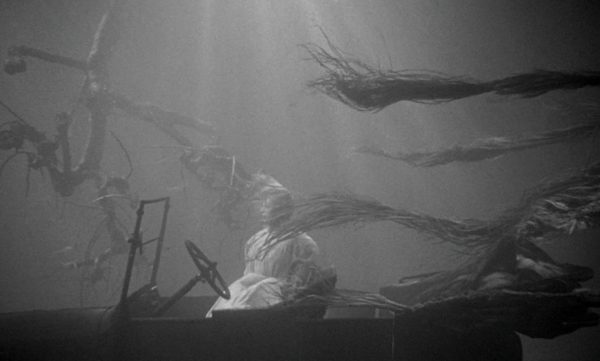
In Horror Bucket List, I fill in gaps in my horror film knowledge based on recommendations from friends on Twitter. We then have a back and forth discussion about their history with the film.
Next up: a jaunt back to 1955 to check out The Night of the Hunter with Talk Movie To Me’s Ms. Sinclair.
Spoilers follow…
Plot: A religious fanatic marries a gullible widow whose young children are reluctant to tell him where their real daddy hid $10,000 he’d stolen in a robbery
I had never seen – or even heard – of The Night of the Hunter before this, which makes me feel a little sheepish considering how well-regarded it is.
Strangely enough this is also a recent watch for you. When did you first see it and why did you want me to check it out?
Yes, The Night of the Hunter was a new discovery for me. I had seen it pop up on numerous movie lists and it peaked my interest instantly. I love black and white atmospheric films and I always lean towards anything with that southern gothic feel. I first watched it only about two months ago and then immediately felt the need to discuss it with someone.
It’s really not a film that would be a good recommendation for everyone; as much as I was desperate to discuss the film, I had to keep in mind who would most appreciate this style of film and the experience watching it. Joe, I truly felt you were the right candidate for this one and I blurted out “you need to see The Night of the Hunter!” quite forcefully when I saw you during Oscar season. So I am beyond excited to be discussing this classic, eerie odyssey with you.
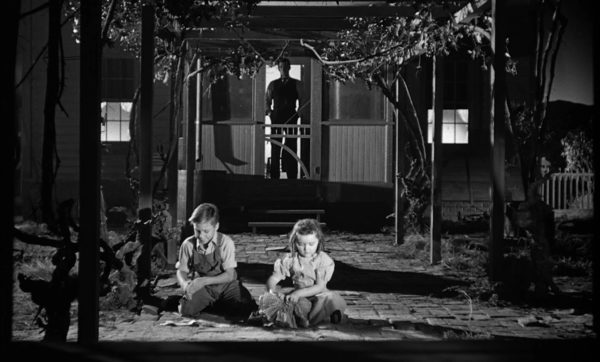
This is primarily a film noir with some horrific, nightmarish imagery, all rendered in absolutely stunning black and white. Is there a specific scene or visual element that comes to mind when you think of the film?
The use of silhouettes is mesmerizing and terrifying. I’m always in awe of this element while watching classic black and white horror/suspense films. The film shows Harry Powell, played by Robert Mitchum, in silhouette for a lot of the most unnerving shots in the film. One of my favourite moments that uses this is when John (Billy Chapin) and Pearl (Sally Jane Bruce) are hiding in a barn at night and there is an opening where they can peer out onto the countryside. John can see the silhouette of Harry on his horse approaching them in the distance. It just gives you this feeling of doom that he is going to find them. Harry is always this dark shadow that is following the children wherever they go.
Yes! And that evokes the moment when the two children wake up from a nightmare earlier on and Harry’s shadow plays on their bedroom wall thanks to the glow of the streetlight. So good!

You mention Robert Mitchum as Harry Powell. He is delivering an all-time performance as the snake-tongued villain who is equal parts hilarious and threatening. What can we even say about him in this movie?!
Shamefully, this is the first movie I have seen Robert Mitchum in. And now I have my work cut out for me because he has an incredibly extensive filmography to get through. But, what an introduction! He had this terrifying duality between madman and sweet talking charmer and you can just imagine all the poor widows that have fallen for this and ultimately met their doom.
His voice is something that really stood out to me. There is an authority and strength to his voice that is immensely commanding and persuasive, and it makes his interactions with John so compelling to watch. It takes a lot of strength for a child to stand up to someone with that level of intimidation.
Harry also sings frequently in this film and it causes this ominous feeling whenever you hear him start crooning “Leaning on the Everlasting Arms.” I found that song to be so haunting and effective.
The film is incredibly grim and fatalistic in its depiction of child abuse, endangerment, abandonment and murder. It’s fascinating how easily Powell is able to deceive and manipulate everyone except Jack.
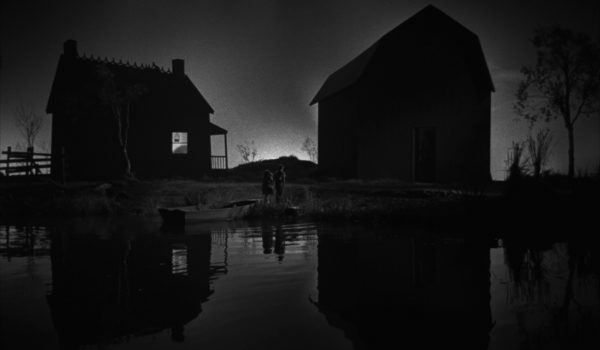
The Night of the Hunter is also patently informed by Bible stories, morality tales and hymns. How do the light and dark elements work together to craft the story? Do you think the film is passing judgment on certain types of people, lifestyles and beliefs?
Agreed, this film is a Holiday stocking full of themes and symbolism! This one is great for multiple viewings because you can focus on something completely new the second time around.
This time, I was very attuned to the treatment of the children, Jack and Pearl, and the responsibility that was put on them. Setting the film during the Great Depression shows how children in dire situations have to grow up so quickly and are exposed to things that no child should have to view at such a young age.
With John, the world doesn’t have a rosey filter. He is seeing things very clearly and is exposed to the harsh reality of his surroundings very early on in the film. He begins to view people with a cynical eye.
The others seem to be looking for escapism in a way. They don’t want to believe the truth of their situation. They are looking for any illusion to keep them from reality. There is also a sense of children carrying the repercussions of their parents’ choices. Jack and Pearl having to hide the money that their father stole and keep it a secret is what sends them down a very dangerous road, making them prey to people with bad intentions. There is a great quote spoken by Rachel (Lillian Gish) in the film, “It’s a hard world for little things.” This really drives home the idea of innocence lost and the plight of children who have been mistreated and the weight they carry throughout their lives because of it.

I think in terms of religion, this film uses light and dark to balance its perspective very well. This helps make the film feel less judgmental. We see the light and the dark displayed with the characters of Harry and Rachel. Harry is a religious man who uses his relationship with god to justify his immoral actions and prey on things weaker than him. Rachel uses her relationship with god to do good and help others who are weaker than her (“I’m a strong tree with branches for many birds”).
When Jack reaches Rachel he is skeptical of religion because his main religious figure has been Harry. He leaves the room when Rachel begins reading the bible story. It takes some time for him to come around to the idea that people also use religion for good and Rachel helps him see this. She is the guiding light back to hope and goodness.
The battle between the two of them – Harry and Rachel – has a certain dichotomy to it: black vs white, good vs evil, selflessness vs greed, etc. One of the elements that I really enjoyed was how straightforward the ending is: there’s no protracted battle or sensational shoot-out. Harry tries to break in and Rachel just shoots him. I love the simplicity!
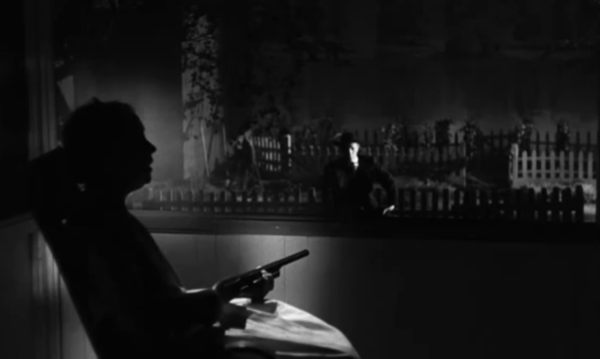
Now unfortunately this film didn’t do well and, in some regards, it’s almost a forgotten gem. Do you see the impact of this film in later films?
I have to say…I found the character of Rachel to be a real badass! The scene with her sitting in her rocking chair, shotgun in hand, waiting for Harry to try and make his move gave me goosebumps. In that moment the hunter becomes the hunted and it’s amazing to see unfold. And you’re right, it isn’t drawn out or overblown with an unnecessary shootout. The real thrill is the eerie stillness as she sits in her chair, staring out into the foggy night, listening, waiting, ready to do anything to protect her young.
I think this film not performing well originally has a lot to do with it being so hard to classify and put into a neat little box. It plays around with different tones, moods and genres. It also challenges religion, which can be a heated topic for a lot of people. I love that it has grown in appreciation and critical praise over time, although it is unfortunate that this was the last film that Charles Laughton directed.
I definitely felt the impact The Night of the Hunter has had on other films while watching it, especially in the southern gothic genre. The unnerving tranquil silence of the deep South reminded me of how I felt while watching films like The Skeleton Key, Winter’s Bone and even True Detective Season 1. The visual style of the film and experimental aspects made me reminiscent of films by David Lynch, and the awe inspiring black and white gave me all the feels the same way the cinematography of Jarin Blaschke did in The Lighthouse.
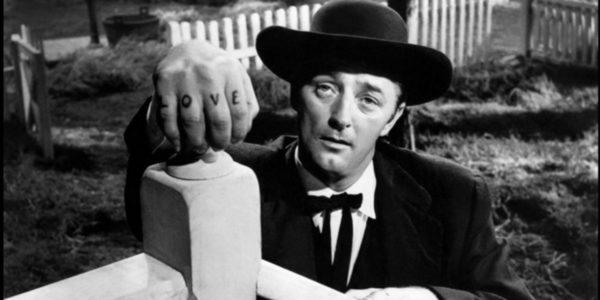
You mention earlier that this is a hard film to recommend. How would you sell folks who are on the fence to give it a try?
This is definitely not just a “throw it on and watch” film, or a film that should be viewed passively. It is a study that you want to chew on for awhile after you’ve finished it. It’s best to watch The Night of the Hunter when you can give yourself over to it and allow the atmosphere to engulf you fully.
I have never seen a film be such a great combination of noir mixed with a dark twisted fairytale before. It truly is one that you will remember. I think it’s just such a diamond in the rough; it isn’t afraid to be completely weird at times and change tonal direction. It’s like walking into a carnival funhouse, at times you are laughing, but at others you are completely petrified.
I’m so glad that I crossed The Night of the Hunter off my list because this feels like a canonical text. The modern cinemagoer in me felt a slight drag near the end, but overall I think that this is a near perfect film. It’s a 4.5/5 for me.
What’s your final rating (out of 5) for The Night of the Hunter? And where can people get in touch with you if they want to follow up?
I am fully behind that decision Joe! I also gave this film 4.5/5.
If anyone wants to hear me discuss more films they can check out the podcast Talk Movie To Me (the show is also on Instagram @talkmovietome). People can also follow me on Letterboxd: MsSinclair.
Next time: a jaunt to South Korea to check out Park Chan-Wook’s sexy vampire film, Thirst, with Jenny Nulf.